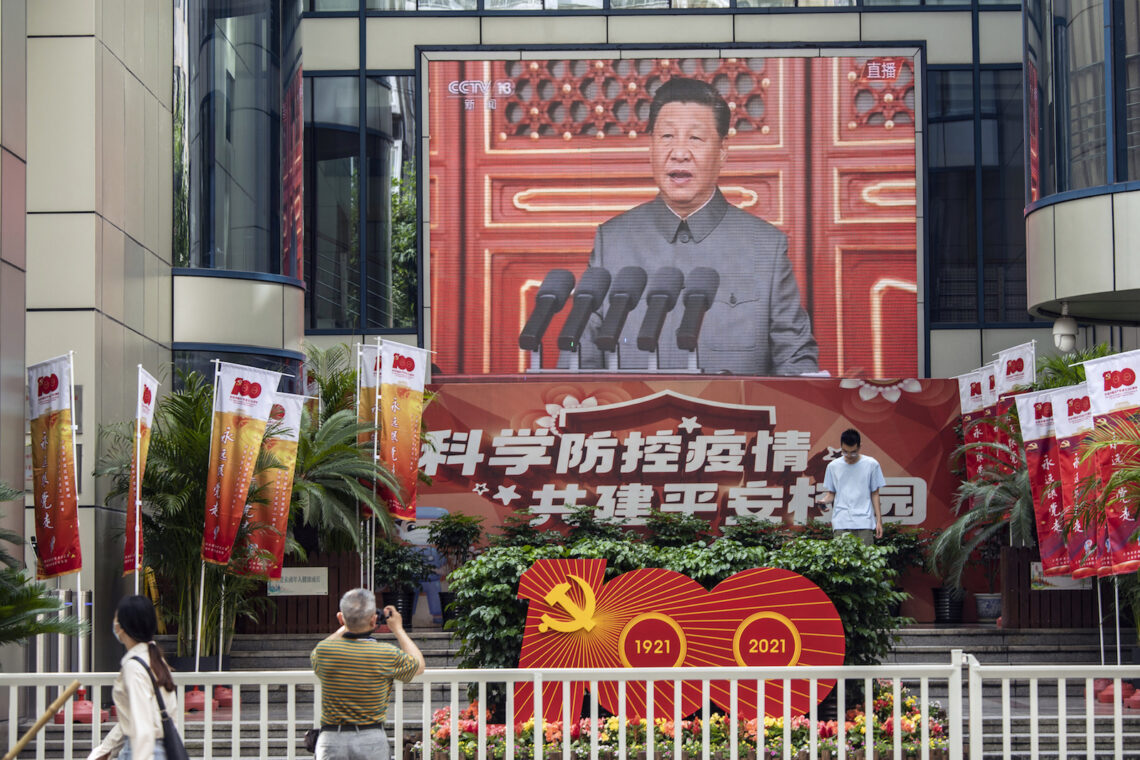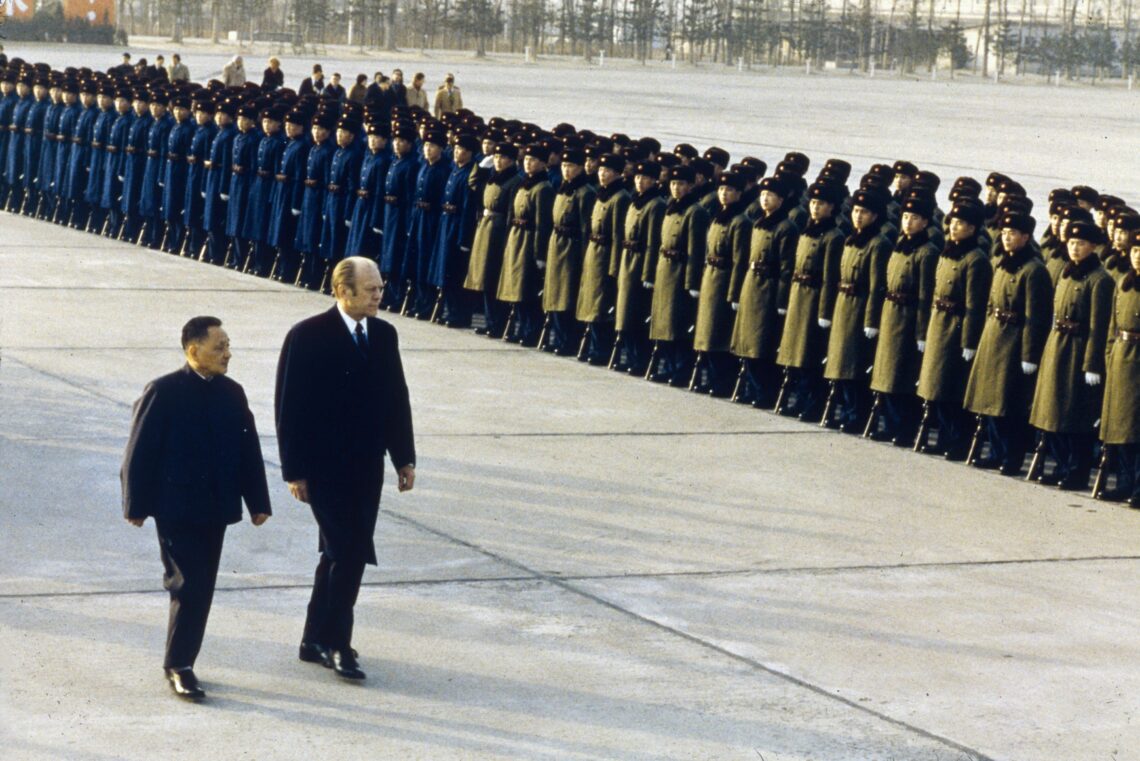Xi Jinping on the CCP’s next hundred years
Xi Jinping celebrated the Chinese Communist Party’s centenary with a fiery address that marked an important strategic shift. Echoed by Chinese diplomats, Mr. Xi’s escalating rhetoric against the United States signals the unfettering of China’s national ambition.

In a nutshell
- Xi’s centenary speech marked a key strategic shift for China
- A more coercive, strident China is expected on the global stage
- Tensions with the U.S. may blunt Chinese ambitions
The July 1 national address by China’s Xi Jinping, celebrating the achievements of the Chinese Communist Party (CCP) on its 100th birthday, marked a key strategic shift for the country. Standing in a Mao suit at a hammer and sickle emblazoned rostrum, President Xi cast his gaze toward 70,000 devotees across Tiananmen Square and delivered his most powerful speech to date.
Through the efforts of the party and the nation, he proclaimed, China had realized the first centenary goal of building a moderately prosperous society. This, said Mr. Xi, meant that the problem of absolute poverty in China had been resolved. China was now marching in confident strides toward the second centenary goal of building China into a great modern socialist country by 2049.
Party and people
Cementing his own role at this historic juncture, China’s leader further demanded that the Chinese people uphold the core position of the general secretary on the Party Central Committee and in the Party as a whole. His speech was replete with language emphasizing the inextricable fusion of the party and the people, with Mr. Xi himself at the helm. Any attempt to divide the Party from the Chinese people or to set the people against the Party was bound to fail, he said.
President Xi has been described by China’s propaganda apparatus as “the core” of the CCP and the “People’s Leader,” leading to speculation that his centenary speech heralds his intent to further distill his own power at the 20th Party Congress next year – and possibly to remain China’s supreme leader indefinitely.
Xi emphasized the fusion of the party and the people, with himself at the helm.
His propagandists also wove a carefully formulated historical narrative into the speech, of the CCP’s legitimacy in orchestrating China’s national rejuvenation after 100 years of humiliation and subjugation at the hands of foreign powers.
National ambition
Yet, it was the thinly veiled warning directed at the United States that attracted a roar of approval from the crowd and alarmed the Western strategic community. Mr. Xi said that “sanctimonious preaching” from those who feel they have the right to lecture China was unacceptable. He stressed that the Chinese nation does not have aggressive or hegemonic traits in its genes, and that it would champion cooperation over confrontation and mutual benefit over zero-sum games.
Mr. Xi emphasized that China had never bullied, oppressed, or subjugated the people of any other country. Any foreign force that attempted to do so to China would find itself on a “collision course with a great wall of steel forged by over 1.4 billion Chinese people,” according to the official English translation.
But the Chinese-language original, which prompted a standing ovation from the crowd, was considerably more colorful. It warned that “heads would be smashed and blood would flow against a wall of steel forged by the flesh and blood of 1.4 billion Chinese people.” The speech has seen over 100 million hits on Chinese social media, and has prompted a wave of nationalist vitriol against the U.S.

President Xi’s speech has been widely viewed as affirming the abandonment of Deng Xiaoping’s “hide and bide” strategy. During the two decades after the latter’s economic reforms and opening up, he sought to gradually build comprehensive national power while suppressing overt strategic ambition. The Deng approach has now been eclipsed by Xi Jinping’s “China dream” of national rejuvenation, allowing unfettered national ambition – both at home and, crucially, on the global stage.
Using Mr. Xi’s clunky mantra for global governance – “a new type of international relations and a human community with a shared future” – China would promote high-quality development of the Belt and Road Initiative and use its new achievements to provide the world with new opportunities. This is coded language for offering a better Chinese alternative to the Western-led rules-based international system, which in the eyes of the Chinese leadership is a moribund relic of the Cold War.
Trap door
China watchers in the West see the speech as a blueprint for a more coercive, strident and discordant China on the global stage, and the recipe for ideological rivalry between China and the U.S. Some fear that the speech signals Xi’s willingness to “decouple” or disentangle China from the liberal world geopolitical order that drove China’s economic miracle. That could mean a zero-sum game fueling a Sino-U.S. security dilemma, and the outbreak of conflict with global consequences.
This anxiety gave rise to the “Thucydides Trap” theory, mentioned in another famous Xi speech from 2015 during his first state visit to the U.S. Popularized by Harvard political scientist Graham Allison, the Thucydides Trap theory shows that over the last five centuries, war resulted in twelve out of sixteen cases where rising powers threatened incumbent powers. In the minority of cases in which war was averted, Allison observes that both sides were helped by a “surge of strategic imagination.”
The address was seen as affirming the abandonment of Deng Xiaoping’s ’hide and bide’ strategy.
Warning that the U.S. and China should read one another’s strategic intentions correctly, in 2015 Mr. Xi claimed that “there was no such thing as the so-called Thucydides Trap in the world.” However, he cautioned, should major countries time and again make the mistakes of strategic miscalculation, they might create such traps for themselves.
During a recent think-tank discussion, Kurt Campbell, White House Coordinator for Indo-Pacific Affairs at the U.S. National Security Council, seemed sanguine about peaceful coexistence between China and the U.S., but envisioned periods of tension ahead. He depicted a very assertive, determined China wanting to play the leading role on the global stage and to reshape the operating system of Asia. Drawing upon recent diplomatic engagements with China, Mr. Campbell said he had been astonished by the behavior of his Chinese counterparts.
New style
This was evident in statements by Politburo Foreign Affairs Chief Yang Jiechi at the first high-level bilateral meeting between the Biden administration and China in Anchorage, Alaska on March 19. The delegations traded barbed comments for an hour before Mr. Yang departed from his diplomatic script into vernacular – to tell his counterparts that the U.S. was not qualified to condescend to China and that the Chinese people would refuse to “eat it.” Mr. Yang was showered with admiration by Chinese netizens upon his return to China; perhaps more tellingly, President Xi’s centenary speech seemed an uncanny (if polished) version of what Mr. Yang told the U.S. in Anchorage.
Jin Canrong, associate dean of the School of International Studies at the Renmin University of China and a prominent voice in Sino-U.S. affairs, shares this newfound bluntness. He says that China offers a similar but more precise prediction: that the U.S. will eventually learn to respect and accept China, but not before some “unavoidable and difficult but necessary confrontations” to make the Americans understand they have no choice.
Western observers see the speech as a blueprint for a more coercive and discordant China on the global stage.
Meanwhile, Mr. Yang’s unbridled comments in Anchorage and President Xi’s centenary rhetoric have had a trickle-down effect on the Chinese diplomatic community. Dubbed “Wolf Warrior” diplomats, senior Chinese foreign affairs officials have used increasingly acerbic language toward the U.S.
In the wake of the recent G7 summit in the UK, Chinese Foreign Affairs spokesman Zhao Lijian described the U.S. as sick and requiring prescription medicine. China’s Ambassador to France Lu Shaye has gained notoriety for an interview he gave to the popular Chinese media platform Guancha, asserting that Wolf Warrior diplomacy was a “justified defense” against Western criticism and that the world must get used to China’s new diplomatic style.
Beyond the vagaries of Wolf Warrior diplomacy, all of the arms of the CCP and China’s organs of state have been instructed to undertake study sessions on the key messages of Xi’s centenary speech and “Xi Jinping Thought.” But elsewhere in Asia, the response has been muted. With simmering flash points across China’s periphery as a big party congress approaches, Beijing will be extremely sensitive to what it describes as interference in its internal affairs. With Xinjiang, Taiwan and the South China Sea among the issues causing contention with the West, a cloud could be cast over the CCP’s 100th birthday party.








